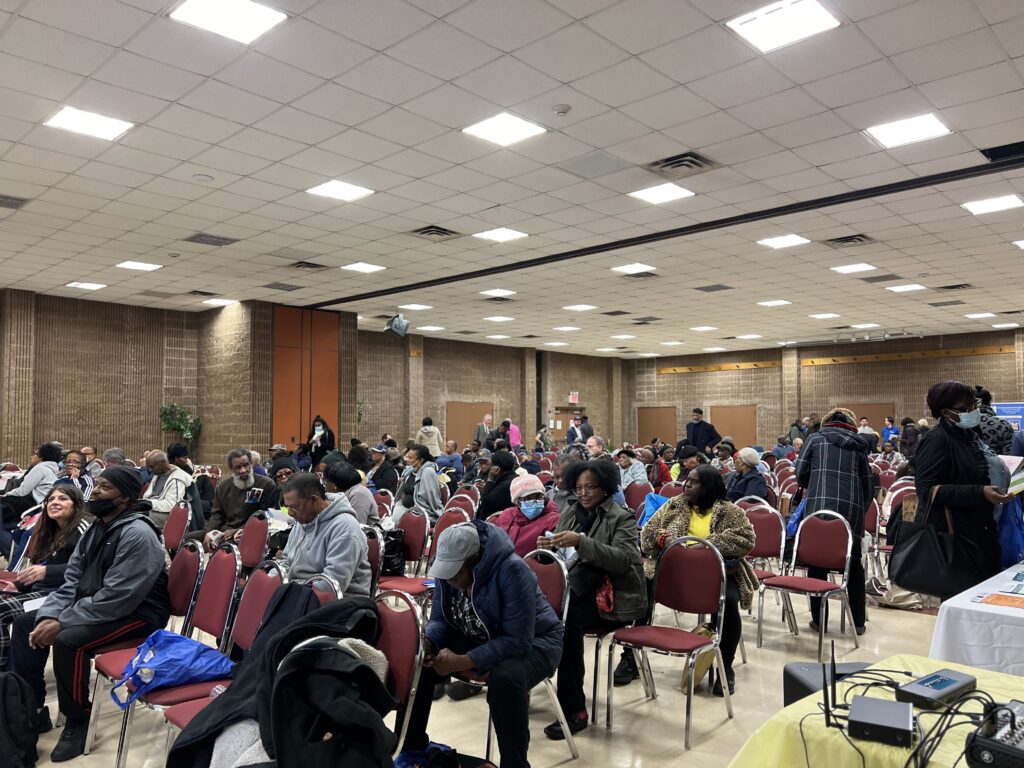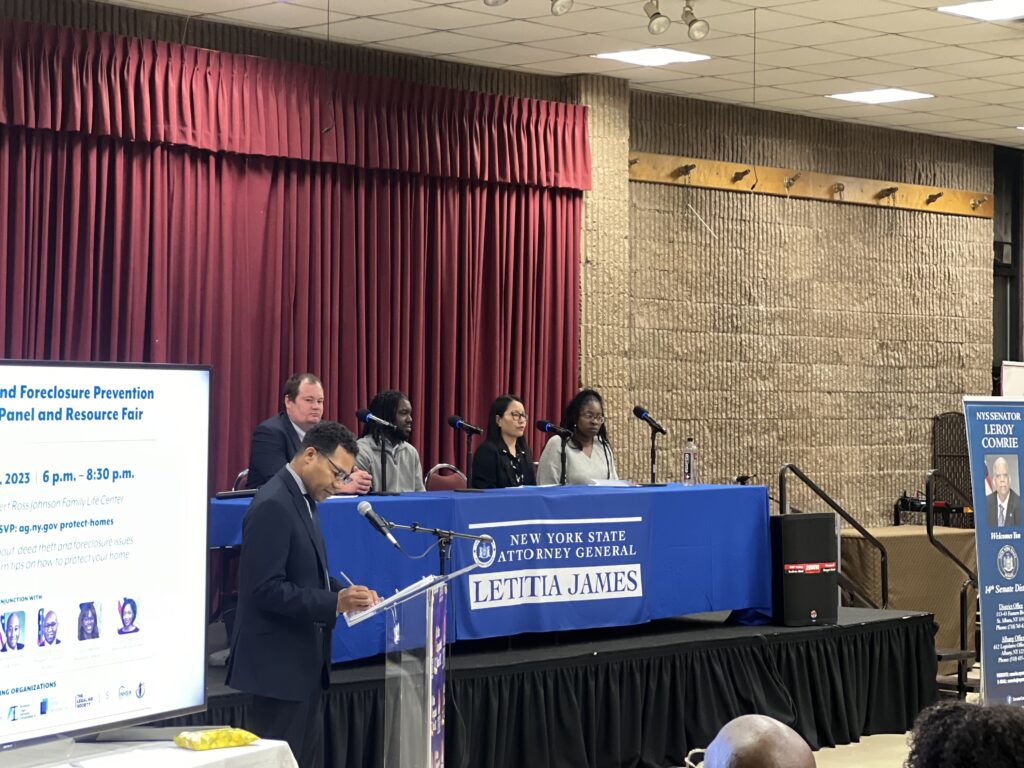By Celia Bernhardt | cbernhardt@queensledger.com
A resource fair and educational panel on deed theft and foreclosure prevention drew hundreds to St. Albans Church in Jamaica, Queens.
The event, held last Thursday evening, was hosted by Attorney General Letitia James’s office. James was unable to attend in person, but a cohort of local reps sponsoring the event were there: Congress Member Gregory Meeks, State Senator Leroy Comrie, Assembly Members Alicia Hyndman and Clyde Vanel, and Council Members Nantasha Williams and Selvena Brooks-Powers. Borough President Donovan Richards was also listed as a cosponsor but did not attend the event.
Nonprofits and community based organizations lined the perimeter of the room. Center for NYC Neighborhoods, The Legal Aid Society and the Chhaya Community Development Corporation were some of those present. Attendees had time at the beginning of the event to visit the organization’s information tables before the program began—then, elected officials in attendance gave brief remarks, and experts from different nonprofit and legal aid groups participated in a panel discussion.
Monica Abend, a representative for the attorney general, told the crowd that their elected officials had requested the event take place.
“This is why we were called to Southeast Queens,” Abend said. “The elected officials here in this community are amazing and fabulous. And they had said, ‘please come to Southeast Queens. Please come talk about deed theft, talk about foreclosure, talk about keeping generational wealth in our communities.’”

Deed theft is difficult to prosecute and comes in a variety of different methods. Leveraging family disputes and unclear wills to manipulate families into partition actions, engaging in fraud, or using forgery—or any combination of the above—are all ways speculators, scammers, and bad real estate actors force homeowner’s hands to relinquish their property or sell it for below market rate.
Deed theft is particularly common in Black and Brown neighborhoods undergoing gentrification, according to analysis from The City. Foreclosure rates, too, are higher among Black and Brown families than white ones—the National Bureau of Economic Research links this to disparities in income stability and cash on hand.
Southeast Queens, and particularly Jamaica, suffers high rates of foreclosure compared to the rest of the borough. Zip Codes encompassing parts of Jamaica, St. Albans, and Springfield had the highest rates of foreclosure in the borough both before the pandemic, in Q3 2019, and after the foreclosure moratorium was lifted, in Q3 2022, according to PropertyShark. In Q1 2023, Jamaica saw the highest rate of first-time foreclosures in the entire city.
“We know that Southeast Queens represent Black homeownership in this nation, and we have to do all that we can to make sure that we are preserving that,” Council Member Brooks-Powers said, addressing the crowd.
“Back in 2008, remember, we got hit hard by the foreclosure crisis at that time. And then coming out of COVID-19, you know, a lot of families have been struggling to make ends meet.”
Assembly Member Clyde Vanel also reflected on the significance of Southeast Queens as a locus for Black homeownership.
“It’s good to see so many people out here, but also it’s kind of sad,” he said. “The cornerstone of our neighborhood is our homes, is homeownership. We worked so hard for these homes. If we lose one house on the block, or two hours on the block, that’s over a million dollars of Black wealth. So this is really important, not about not just about keeping our homes but about our legacies and about building our wealth.”
Abend told the crowd that a frequent refrain from residents facing foreclosure and deed theft is that they don’t know where to go for help.
“That’s why we’re here today. This is where you need to go,” Abend said. “Every single organization that’s surrounding us, like hugging us, these are your people to go to. They are the experts, over and beyond.”
Throughout the speeches and panel, speakers frequently came back to methods to prevent foreclosure or deed theft from taking place or progressing beyond one’s control. Planning a comprehensive will, talking to trusted family members if mortgage difficulties or scams arise and reaching out to homeowner-supporting organizations to learn about one’s options were practices highlighted repeatedly.

Speakers also frequently reminded the crowd that there was an election coming up, and implored them to vote. At one point in the remarks, a lone man with a megaphone interrupted the speakers to shout at the crowd to vote Republican before being escorted out by event staff.
State Senator Leroy Comrie was one of those who emphasized the importance of the vote, as well as consistent activist pressure on Albany. He mentioned that State Democrats were pushing two bills aimed at helping those at risk of foreclosure, and that courts throughout the state needed consistent pressure to “follow the law.”
“The courts are allowing the banks to lie about not having documentation when they’ve had it,” the Senator said, to murmurs of agreement from the crowd. “They’ve allowed the banks to change personnel so that when they get to the foreclosure meetings, they’re claiming that they don’t have the documents. They’re doing all kinds of tricky things to try to take people out of the house, even if you have an agreement. They’re trying to have someone call you and act like they hadn’t heard any agreement and they’re forcing you to pay money. There’s a lot going on,”
Despite the high turnout, not all attendees found the event to be completely helpful. 61-year-old Sonia Cole, who currently resides in Coney Island but used to live in Southeast Queens, said she’s been fighting a complicated deed theft battle for two decades. She said that the resources for preventing foreclosure or deed theft from occurring in the first place often don’t transfer over to situations where one is already caught in the middle of it.
“You’re telling [us], the neighborhood, all these things—‘You want help? You want help?’—but we’re still going around in a circle,” Cole said. “Because I’m wondering how many people this happened to. It can’t just be me.”



